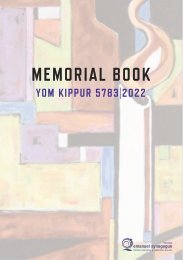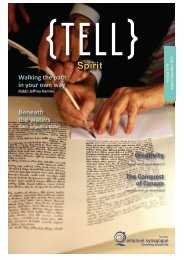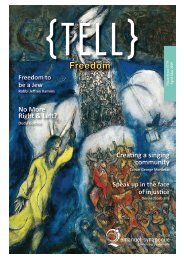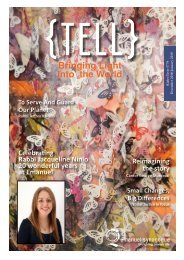TELL May-June 2020
TELL Magazine is is the publication of Emanuel Synagogue, Sydney.
TELL Magazine is is the publication of Emanuel Synagogue, Sydney.
You also want an ePaper? Increase the reach of your titles
YUMPU automatically turns print PDFs into web optimized ePapers that Google loves.
by Cantor George Mordecai
{THE SEARCH FOR HAMETZ CONTINUES}
Over the past year, on the third Shabbat morning of each month, a group has gathered in
Emanuel’s Neuweg Sanctuary to co-author a spiritual ritual known as Shabbat in the Circle.
We sing, meditate and wrestle
with questions of Jewish theology,
theodicy, history, mysticism and
our own personal relationships
with our tradition. Everyone in
the group brings something very
special to the Circle. Now, due to
COVID-19, the Circle takes place
on Zoom, on Thursday evenings.
Despite its challenges, the virtual
reach-out has not diminished
the intensity and quality of the
engagement. Just before Pesach
we had an especially powerful
discussion of the inner meaning
of bediqat hametz, the ritual that
takes place the day before Pesach,
wherein we search our homes for
the last fragments of hametz.
Our mystical tradition is very
interested in taking a close look
at hametz and reimagining its
meaning. The mystics juxtaposed
matzah and hametz. Since matzah
consists of the same ingredients
as bread, how are they different?
The only difference between
matzah and bread is that matzah
is allowed to bake in the oven
for a maximum of 18 minutes.
Unlike bread, it therefore does
not rise—matzah is unleavened.
The Gematria (ancient Hebrew
numerological system) of 18
in Hebrew is hai, life. Matzah
is said to represent life and the
hiyut—the Divine life-force
which flows from the Sourceof-All-Life
to all Creation.
The process—leavening—by
which a food becomes hametz
is seen as a metaphor for pride,
arrogance and distance from
the Divine Source-of-All-Life.
Therefore, the essential meaning
of bediqat hametz—the search
for hametz on the evening before
Pesach—is to look deeply into
our being and to locate all the
places where we need to see
improvement. Are we still too
arrogant in our interactions with
others? Are we seeing ourselves the
way we really are, as opposed to
how we imagine ourselves to be?
There is a delightful story from
the Sufi tradition that shines
light on this process of searching
out our internal hametz:
A man was walking home one night
when he saw the Mulla Nasrudin
on his hands and knees on the road.
The Mulla was searching frantically
24















